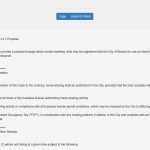If your City or County is currently in the process of drafting or revising an ordinance pertaining to the housing, code, safety, permitting, and taxation rules related to short term rentals, this tool can help. The free Short Term Rental Ordinance Tool allows the user to drag and drop sections or subsections of some existing ordinances which have addressed some of the challenges already. Each of the cities identified below have been carefully curated and selected throughout the country.
You can add your own sections as well in the Editor, either from scratch or with an existing section/subsection. There are a few model cities shown, and the cities were chosen with the help of Michael Lustig from LetsRegulate.com.
Below are some examples of language to include in a model ordinance, based upon those in the model Cities so far:
- “Limiting to Primary Residences,” protects “Home-Sharing”, a benign activity that helps residents make ends meet, while curbing the proliferation of “commercial units” that deplete housing stock and exacerbate affordable housing shortages.
- “Mandatory Registration and Reporting by Hosts,” these provisions set the rules for hosting, tells the City exactly how many STRS are legal and creates a unique set of data for the city that aids enforcement.
- “Platform Accountability” The City led the country with the inclusion of broader Platform Liability language that sets the rules for all Platforms, aids enforcement, including data sharing provisions, reporting requirements and delisting upon takedown notices from the City.
- “Enforcement” The City ordinance was the first to define violations, enforcement, and the appeals process. In addition, it creates a separate Office of Short-Term Rental Administrations and details the rights and responsibilities of the City to manage and enforce the Ordinance.
- “Definition of Primary Residence” City’s definition increases the minimum length of annual occupancy at the residence to 275 days a year.
- “Capping the Total Number of Permits” is a smart provision gives the City control over growth by limiting the “total number” of STRs allowed and puts new applications into an approval queue determined by Planning Commission and prohibits any new “Non-Hosted” short-term rentals. The CA Coastal Commission approved this provision in April 2018.
- “No Property Right” is provision that clearly states operating an STR is a provision and not property right. This is an essential provision in Cities that are concerned about litigation over “takings.”
- “Property Development Standards” is another failsafe provision that was added to the ordinance requiring Planning Commission approval for the expansion of any permitted dwelling that is operating as an STR.
If you are interested in signing up for this tool, please fill out the form below to get started. It will take up to 3 business days to get your Ordinance Tool account setup:
Error: Contact form not found.




